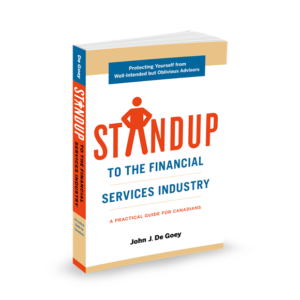Fight for your right to low fees
STANDUP, a new book by advisor John De Goey, shows how expensive, active advice costs Canadians billions of dollars—and offers low-cost alternatives.
Advertisement
STANDUP, a new book by advisor John De Goey, shows how expensive, active advice costs Canadians billions of dollars—and offers low-cost alternatives.

 All of which makes the the new book by advisor and author John De Goey of interest to both retirees and those hoping to get there someday. Having written STANDUP to the Financial Services Industry, De Goey is unlikely to win many friends amongst his colleagues. Aimed at financial consumers, this phrase adorns the top of the cover: “Protecting yourself from well-intended but oblivious advisors.”
De Goey declares that much of what advisors believe is “demonstrably wrong.” As he puts it: “People who give advice for a living routinely give bad advice while honestly believing that the advice they are giving is, in fact, good. That’s a huge problem.”
He places much of the blame on the managers of retail advisors, chiefly the senior members of Canadian mutual fund companies. He hauls out the old quote by American novelist Upton Sinclair to illustrate the gap between doing what’s good for investors and what’s profitable for the financial industry itself: “It is difficult to get a man to understand something when his salary depends upon his not understanding it.”
De Goey has long been a critic of “embedded compensation,” chiefly the trailer commissions paid out by mutual fund companies to advisors who sell their funds. Most stock-based Canadian mutual funds have an annual trailer of 1%. An increase in trailers corresponds to a decrease in performance, and vice versa, De Goey says: “Advisors might be better seen as unwitting accomplice intermediaries between some sophisticated corporations and trusting Canadian consumers.”
A more transparent approach is a fee-based model, where fees or commissions are not hidden and are broken out and paid by clients separately as a set annual percentage of assets under management. (DeGoey long ago shifted his own practice to a fee-based model.) He regards himself as a “STANDUP” advisor and devotes the last chapter of the book to convincing the trailer-commission crowd to join him.
STANDUP is De Goey’s somewhat convoluted acronym: It stands for Scientific Testing and Necessary Disintermediation Underpin Professionalism, and STANDUP was an undercurrent in the four editions of De Goey’s previous book, The Professional Financial Advisor. There he argued that while most advisors hold themselves out to be professionals, like lawyers or accountants, the primary function of most advisors is “to sell products.” Presumably, STANDUP advisors are the “self-aware and knowledgeable advisors” his book aims to help readers find, and De Goey argues the “STANDUP paradigm” represents the future of professional financial advice. The old paradigm lasted as long as it did only because of the erroneous presumption that things would improve through more disclosure, investor education and regulatory reform. “All have failed,” he asserts.
Asked what part of his new book is most relevant to retirees, De Goey points to two paragraphs on pages 74 and 75. These show that in the Wealth Accumulation phase, paying lower fees results in meeting your retirement goals 2.5 years sooner; and that in Decumulation, lower fees result in your savings lasting at least 10 extra years. “All else being equal, a client with the same asset mix and paying the same advisory fee, but paying 1% less in product costs will earn 1% more over the course of their lifetime.” But investors too often fail to ask advisors to explain why they don’t recommend cheaper investment products.
Sadly non-STANDUP advisors still appear to dominate, based on De Goey’s estimate that 10 times more Canadian money is held in high-cost investment products than low-cost. He also notes that there is a bias in favour of expensive and active products.
Billed as a “practical guide,” De Goey’s book lists dozens of questions investors should ask their current or prospective new advisors, meant to identify their STANDUP qualities or lack of same. Designed to help “ensure Advisor accountabilitym” the book lists how to spot major misguided beliefs and how to decode “advisor doublespeak” about why costs do or do not matter. He suggests a fair price for passive products is under 0.3% a year and, for active products, 1%.
My suspicion is De Goey will end up preaching only to already-converted STANDUP advisors: I can’t imagine it will register with the miscreants unless their clients actually do stand up to the industry in the tens of thousands. That’s what De Goey hopes will happen—in which case even the non-STANDUP crowd will be forced to pay attention, if only to understand what they’re up against should the new paradigm go mainstream.
Jonathan Chevreau is founder of the Financial Independence Hub, author of Findependence Day and co-author of Victory Lap Retirement. He can be reached at [email protected]
All of which makes the the new book by advisor and author John De Goey of interest to both retirees and those hoping to get there someday. Having written STANDUP to the Financial Services Industry, De Goey is unlikely to win many friends amongst his colleagues. Aimed at financial consumers, this phrase adorns the top of the cover: “Protecting yourself from well-intended but oblivious advisors.”
De Goey declares that much of what advisors believe is “demonstrably wrong.” As he puts it: “People who give advice for a living routinely give bad advice while honestly believing that the advice they are giving is, in fact, good. That’s a huge problem.”
He places much of the blame on the managers of retail advisors, chiefly the senior members of Canadian mutual fund companies. He hauls out the old quote by American novelist Upton Sinclair to illustrate the gap between doing what’s good for investors and what’s profitable for the financial industry itself: “It is difficult to get a man to understand something when his salary depends upon his not understanding it.”
De Goey has long been a critic of “embedded compensation,” chiefly the trailer commissions paid out by mutual fund companies to advisors who sell their funds. Most stock-based Canadian mutual funds have an annual trailer of 1%. An increase in trailers corresponds to a decrease in performance, and vice versa, De Goey says: “Advisors might be better seen as unwitting accomplice intermediaries between some sophisticated corporations and trusting Canadian consumers.”
A more transparent approach is a fee-based model, where fees or commissions are not hidden and are broken out and paid by clients separately as a set annual percentage of assets under management. (DeGoey long ago shifted his own practice to a fee-based model.) He regards himself as a “STANDUP” advisor and devotes the last chapter of the book to convincing the trailer-commission crowd to join him.
STANDUP is De Goey’s somewhat convoluted acronym: It stands for Scientific Testing and Necessary Disintermediation Underpin Professionalism, and STANDUP was an undercurrent in the four editions of De Goey’s previous book, The Professional Financial Advisor. There he argued that while most advisors hold themselves out to be professionals, like lawyers or accountants, the primary function of most advisors is “to sell products.” Presumably, STANDUP advisors are the “self-aware and knowledgeable advisors” his book aims to help readers find, and De Goey argues the “STANDUP paradigm” represents the future of professional financial advice. The old paradigm lasted as long as it did only because of the erroneous presumption that things would improve through more disclosure, investor education and regulatory reform. “All have failed,” he asserts.
Asked what part of his new book is most relevant to retirees, De Goey points to two paragraphs on pages 74 and 75. These show that in the Wealth Accumulation phase, paying lower fees results in meeting your retirement goals 2.5 years sooner; and that in Decumulation, lower fees result in your savings lasting at least 10 extra years. “All else being equal, a client with the same asset mix and paying the same advisory fee, but paying 1% less in product costs will earn 1% more over the course of their lifetime.” But investors too often fail to ask advisors to explain why they don’t recommend cheaper investment products.
Sadly non-STANDUP advisors still appear to dominate, based on De Goey’s estimate that 10 times more Canadian money is held in high-cost investment products than low-cost. He also notes that there is a bias in favour of expensive and active products.
Billed as a “practical guide,” De Goey’s book lists dozens of questions investors should ask their current or prospective new advisors, meant to identify their STANDUP qualities or lack of same. Designed to help “ensure Advisor accountabilitym” the book lists how to spot major misguided beliefs and how to decode “advisor doublespeak” about why costs do or do not matter. He suggests a fair price for passive products is under 0.3% a year and, for active products, 1%.
My suspicion is De Goey will end up preaching only to already-converted STANDUP advisors: I can’t imagine it will register with the miscreants unless their clients actually do stand up to the industry in the tens of thousands. That’s what De Goey hopes will happen—in which case even the non-STANDUP crowd will be forced to pay attention, if only to understand what they’re up against should the new paradigm go mainstream.
Jonathan Chevreau is founder of the Financial Independence Hub, author of Findependence Day and co-author of Victory Lap Retirement. He can be reached at [email protected]
Share this article Share on Facebook Share on Twitter Share on Linkedin Share on Reddit Share on Email